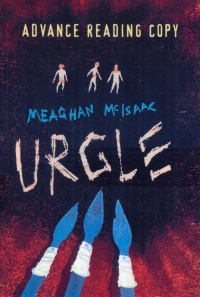| ________________
CM . . .
. Volume XX Number 4. . . .September 27, 2013
excerpt:
The Ikkuma Pit, a vast and isolated wasteland of rock and ash, has kept Urgle and generations of his fellow Brothers—all of whom are orphans, abandoned as babies by the “Mothers”—safe from the dangers of the wider world around them. That is until an unlikely but familiar face appears with a gang of rabid creatures hot in pursuit. When these pursuers fail to retrieve what they came for, they take whatever they can get their hands on which unfortunately happens to be Cubby, Urgle’s “Little Brother.” With almost no thought on the matter, Urgle leaps into action. But with no idea where they are heading and with little chance of successfully tracking them, Urgle is lost. Striking an alliance with the man who brought these creatures to his doorstep, however, Urgle, along with his best friend Av, and two other of his Ikkuman Brothers, travels deep into the heart of enemy territory in search of a jungle fortress where Cubby is likely being held. The trek is perilous, but Urgle and his Brothers are glad to make it if it means bringing Cubby home safe and sound. However, little do they know that, the further they march, the more they will learn about the outside world and the terrible truth about their own origins in the Pit. These revelations are world shattering for Urgle—if he is to believe them— as is the escalation of an age-old Holy War he and his Brothers regrettably find themselves dragged into. In terms of plot, Urgle shares basic similarities with Patrick Ness’s The Knife of Never Letting Go (Book One of the popular and highly praised “Chaos Walking” series); both Ness and McIsaac, for example, despite occupying slightly different genres of action-adventure fiction, employ worlds ‘depopulated’ of women that are under the threat of tyrannical forces. Parallels can also be found with Lena Coakley’s stellar novel Witchlanders in which issues of faith (initially obscured by religious fanaticism and revisionist history) rise to the surface to reveal the existence of shared beginnings among seemingly disparate peoples. Despite such similarities with other works, Urgle is very much its own book, wonderfully conceptualized and structured to offer readers thought-provoking subject matter and dialogue throughout. Much of this is driven through the character of Urgle. Tough and intelligent, he however, struggles mightily with feelings of self-doubt and uselessness, especially when in the presence of Fiver, a fellow Brother, who is always quick to point out Urgle’s shortcomings. Also, as a boy who feels he has much to prove, Urgle makes his fair share of questionable choices; not to worry, he makes up for this elsewhere, most notably as he possesses a courageous spirit and a tremendous tenacity to ask and do what others would hardly ever dare. Oddly however, despite the opportunity to do so numerous times over, it never crosses Urgle’s mind to make basic inquiries into the book’s central mystery: i.e. why the Mothers abandon their male offspring to the Pit. The concealment of this information comes across as somewhat illogical, impeding the natural flow and evolution of things which should be discussed and discovered by characters. While it is understandable why McIsaac takes this path—like all good writers, she is attempting to build suspense and create an impactful climax—the story perhaps would have been better served with an earlier reveal. Although, to be fair, most readers will be so impressed with what is uncovered, and shocked (if not saddened) by the not so happy ending to view this—one of the book’s few faults— with any lasting displeasure. Urgle is then, despite being a debut, an ambitious novel which should impress epic fantasy enthusiasts thoroughly. A sequel, however, is very much needed to flesh out some of the story’s loose ends and further explore the remarkable and richly rendered world that McIsaac has created; otherwise, an excellent read perfectly suited for middle grade audiences. Recommended. Andrew Laudicina, a MLIS graduate from the University of Western Ontario in London, currently resides in Windsor, ON.
To comment
on this title or this review, send mail to cm@umanitoba.ca.
Copyright © the Manitoba Library Association. Reproduction for personal
use is permitted only if this copyright notice is maintained. Any
other reproduction is prohibited without permission.
NEXT REVIEW | TABLE OF CONTENTS FOR THIS ISSUE
- September 27 2013.
AUTHORS |
TITLES |
MEDIA REVIEWS |
PROFILES |
BACK ISSUES |
SEARCH |
CMARCHIVE |
HOME |
